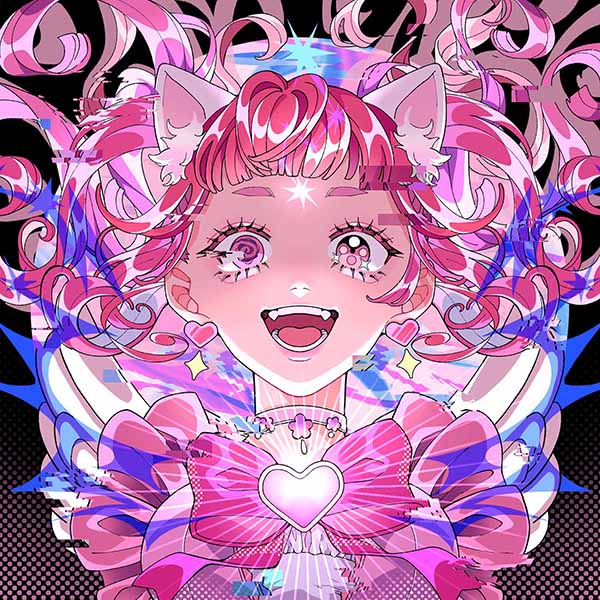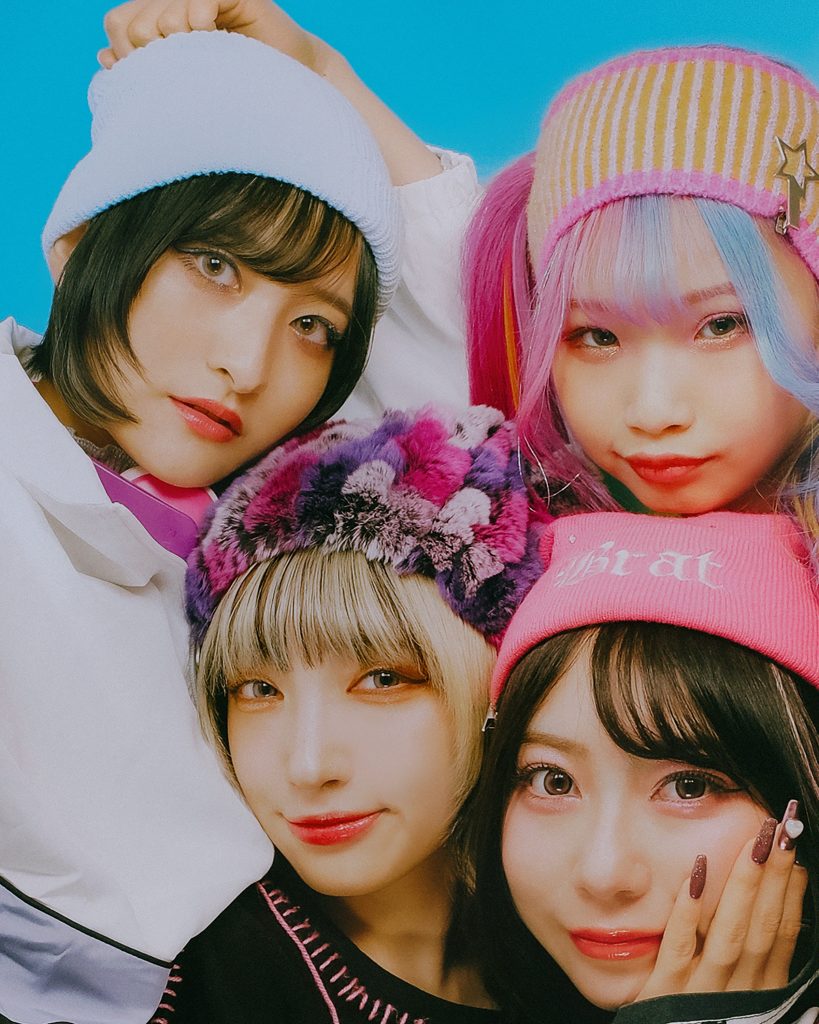
HANABIE.
Girls metal band formed in 2015. Consists of four members Yukina (vo), Matsuri (gt. & vo), Hettsu (ba & cho), and Chika (dr). Their intense metal rock sound, lyrics and visuals consisting of Japanese subculture and values, have attracted the attention of fans. Middle and high school classmates Yukina, Matsuri, and Hettsu started as a four-piece band, bringing on Chika as the new drummer in May of 2023. In July of the same year, they made their major label debut with Sony Music Labels Epic Records Japan, releasing their first album, Reborn Superstar! They embarked on their first solo domestic tour, secured slots at music festivals, and even toured internationally. They released their new single “O・TA・KU Lovely Densetsu” on January 19th, 2024.
https://hanabie.jp
X:@HA_NA_BIE_
Instagram:@ha_na_bie_
Threads:@ha_na_bie_
YouTube:@HANABIE_official
While there are many Japanese bands that have made it to the world stage, the common factor among ones that succeed globally may be that they all exude “Japaneseness”. There is a Japanese girls band that has established a new genre coined “Harajuku core” gaining enthusiastic support from metal fans mostly from the West. The band consists of four members: Yukina (vo), Matsuri (gt & vo), Hettsu (ba & cho), and Chika (dr). They call themselves HANABIE.
Their single “Pardon Me, I Have To Go Now” released in January 2023 triggered their sudden success. The music video released by Epic Records Japan six months prior to their debut has garnered 5.5 million plays on YouTube so far, the video overflowing with English comments from international fans. Wrapped in colorful outfits reminiscent of Harajuku-style Decora fashion, Yukina alternates between a cute anime-like voice and intense death growls, while the instrumentalists deliver sounds with lively melodies and heavy rhythms. It’s this contrast that defines their performance style.
Not only did they embark on their first solo tour after their major label debut, they also secured slots at music festivals and even toured internationally. We interviewed HANABIE., a rising force in the music scene, to discuss their journey. In part one, Yukina and Matsuri shared insights into the formation of the band and the struggles that led to the establishment of their performance style.
– This past year was quite the year of achievements for you.
Yukina: It was truly beyond our expectations. Of course we had our hearts set on touring abroad, but this was a year we gave our all to each of our performances.
Matsuri: Emotionally, we felt we needed to tackle what was right in front of us, but I think it was a huge turning point for us as a band because it was a year filled with firsts.
– Band members changing, your first festival appearance, first solo show, first Tokyo/Nagoya/Osaka tour, your major label debut, and your first international tour all happened this past year. I don’t think there has ever been a band that has experienced their first domestic tour and first international tour in the same year. From an outsider’s perspective, it looks like you had a crazy year. But were you so busy focusing on each task at hand that you couldn’t see your achievements objectively?
Matsuri: There was no time for us to relax. All we could do was focus on our immediate tasks each day.
Yukina: Each event was so intense, yet time passed instantly. Going through this made me want to continue doing it, which made me realize there are so many things I still want to do. So, while I feel grateful, I also feel overwhelmed with excitement for future endeavors.
– It’s unbelievable that your single “Pardon Me, I Have To Go Now” wasn’t even released this time last year.
Matsuri: Truly! I had the same thought the other day. I was curious how many plays the YouTube video had gotten, and when I went to check it, I was surprised to see it wasn’t uploaded that long ago.
– It’s like our internal calendars are fully glitching.
Matsuri: Glitching (laughs).
Yukina: No, really.
High School Rock Band Club Era When Rivalries were Rampant
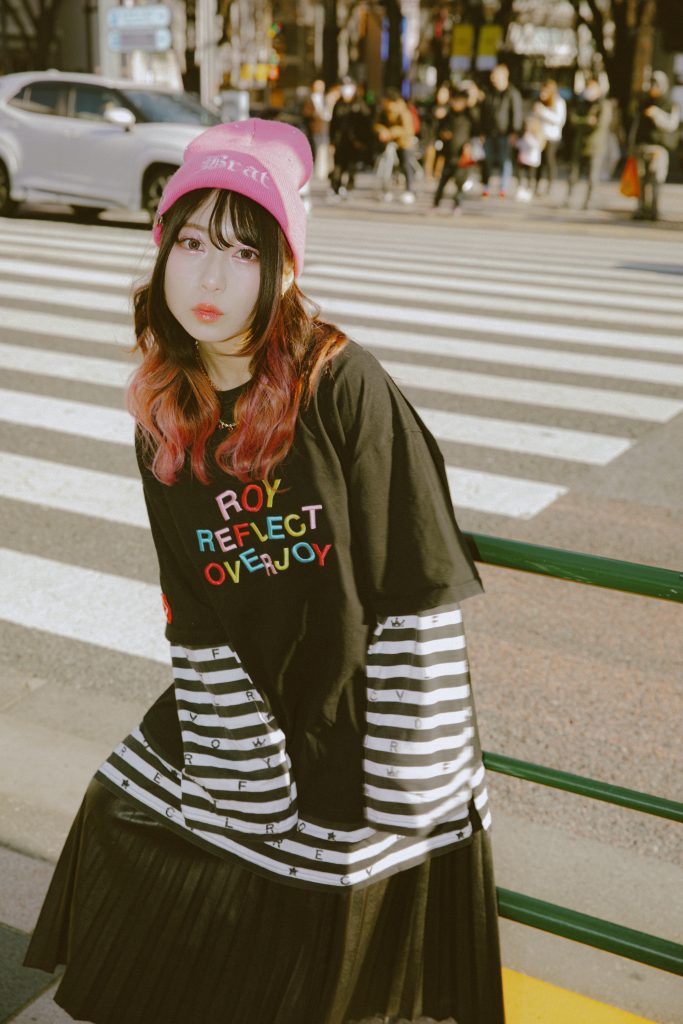
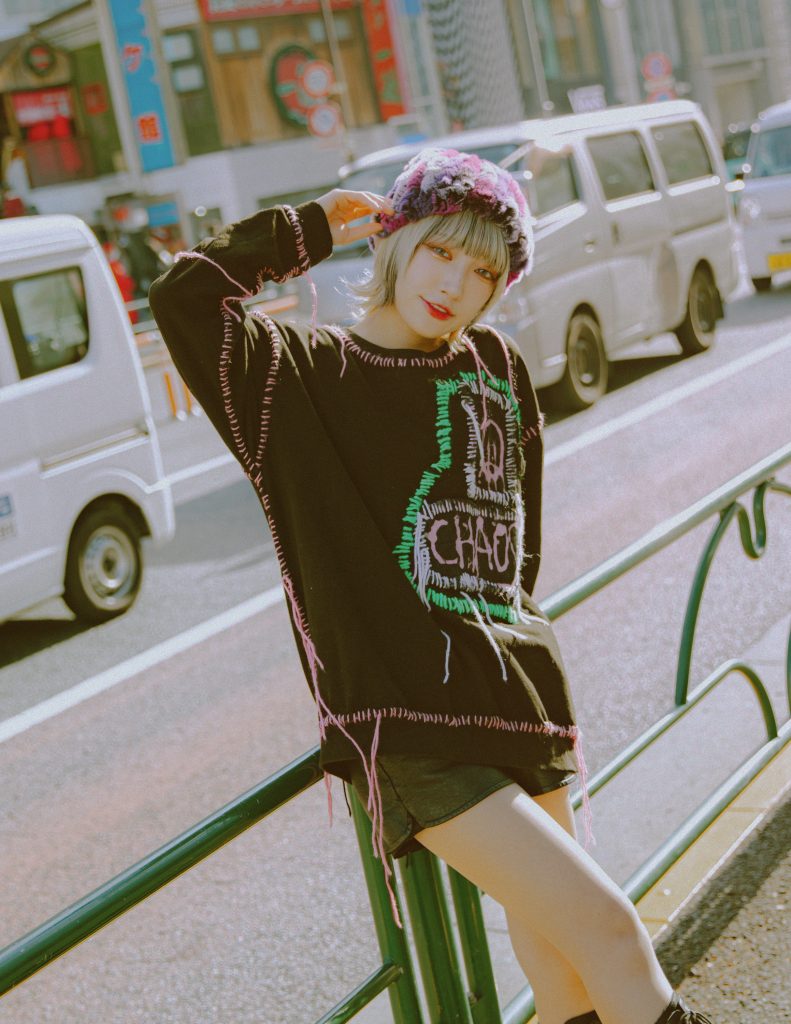
– So, since this is HANABIE.’s first interview with TOKION, I’d like to start with asking how you formed the band. I heard that it was formed in a high school after-school band club.
Yukina: Since we went to a combined junior high and high school, Matsuri and the bassist Hettsu were classmates since middle school. After-school band club was only for high school students, and Hettsu and I had already talked about joining. I had heard rumors that Matsuri, who I hadn’t really talked to until then, was into heavy music, so I approached her and asked if she actually liked that kind of music and what she was currently listening to.
Matsuri: I was already close with the original drummer of HANABIE. She had been in the brass band club, and I was interested in rock bands but not that enthusiastic about joining the club. I was more like, “I guess I’ll join the rock band club”. Yukina approached me at that time, so I joined the club. I thought there would be people who would have the same interests as me, so I joined, treating it like a trial run.
Yukina: Matsuri already played guitar and liked heavy music, so I knew we had to get her in the club. She was also a leader-like figure in the classroom, so I thought her leadership skills would translate well in a band.
– In contrast to Matsuri, you weren’t the bubbly personality, Yukina. You were more of an introvert, weren’t you?
Yukina: That’s right. Hettsu and I were in the art club in middle school, drawing in the corner of the room together. Matsuri, on the other hand, was in a sports club and was the class leader.
– I’m sure you had to muster up a lot of courage to approach her first.
Matsuri: I feel like it was pretty natural. I think she asked me if I liked heavy bands when we ran into each other in the hallway. As we talked, I got to know Yukina better and we started going to shows together.
Yukina: We went to music festivals together, too. We got deep in it together.
Matsuri: In our Dickies (laughs).
– Approaching someone in a school hallway is like a scenario you’d see in an anime.
Matsuri: It is, now that I think about it (laughs). I remember that interaction so well.
Yukina: I don’t remember (laughs).
Matsuri: We weren’t in the same after-school club in middle school, so I wondered why she approached me. I also wondered why she knew I was into rock bands.
Yukina: Matsuri would often bring her favorite band’s towels to gym class, and our other classmates confirmed you liked those bands.
– Yukina, were you interested in playing heavy music from the start?
Yukina: I wasn’t sure if we could pull it off, but I knew it would be fun since we had that interest in common.
– And specifically, your common interest in MAXIMUM THE HORMONE.
Yukina: Yes.
– Any other bands you two were excited about back then?
Matsuri: We both listened to a lot of BABYMETAL, which sparked conversation.
Yukina: That’s true.
Matsuri: I also liked punk/melodic hardcore music, like GOOD4NOTHING and SHANK.
Yukina: Or dustbox and ELLEGARDEN.
– And thus, HANABIE. was born, but you started off as a cover band. Which bands did you cover?
Matsuri: I think SCANDAL was first? Or DOES.
– Interesting!
Yukina: We flipped through the hand-me-down scores from our seniors religiously (laughs).
Matsuri: We picked ones we thought we could play.
– So you honed your skill that way and eventually started playing covers of MAXIMUM THE HORMONE?
Yukina: We actually initially wanted to start with HORMONE, but our seniors stopped us (laughs). They told us to learn the basics first.
Matsuri: We covered their songs after we got the hang of it.
– What was the MAXIMUM THE HORMONE song you covered first?
Yukina & Matsuri: (immediately) “Zekkyou Billy”.
– I’m surprised you remembered that quickly.
Matsuri: That’s true!
Yukina: I remember it quite clearly (laughs).
– What other songs did you cover?
Matsuri: “Jitterbug” (by ELLEGARDEN). We also did BLUE ENCOUNT.
Yukina: We also covered the song “Katoniago” by a girls band called FLiP, and also WHITE ASH.
Matsuri: Oh yeah we did! I loved WHITE ASH.
Yukina: We also played some ZebraHead tunes.
Matsuri: I brought that score and asked if we wanted to cover it (laughs).
– I can’t believe there are scores for ZebraHead songs.
Matsuri: There are! I still have them back home (laughs).
– The drummer has changed, but have the relationships between the members changed much over the years?
Matsuri: They have changed a bit because we’re all adults now, but I don’t think they’ve changed all that much, fundamentally.
Yukina: Hettsu hasn’t changed, either.
Matsuri: But she’s becoming more and more like an alien.
– Like she’s more liberated?
Matsuri: Yes, she is (laughs).
– As I was listening to you tell this story, I realized the environment of an all-girls school was probably a major part of your development.
Yukina & Matsuri: I think that’s right.
Matsuri: If there were both guys and girls in our school, our band may have been co-ed. But because it was an all-girls band, there was an insane amount of intensity among the girls in the club. We were all like, “I’m going to crush you all!” (laughs).
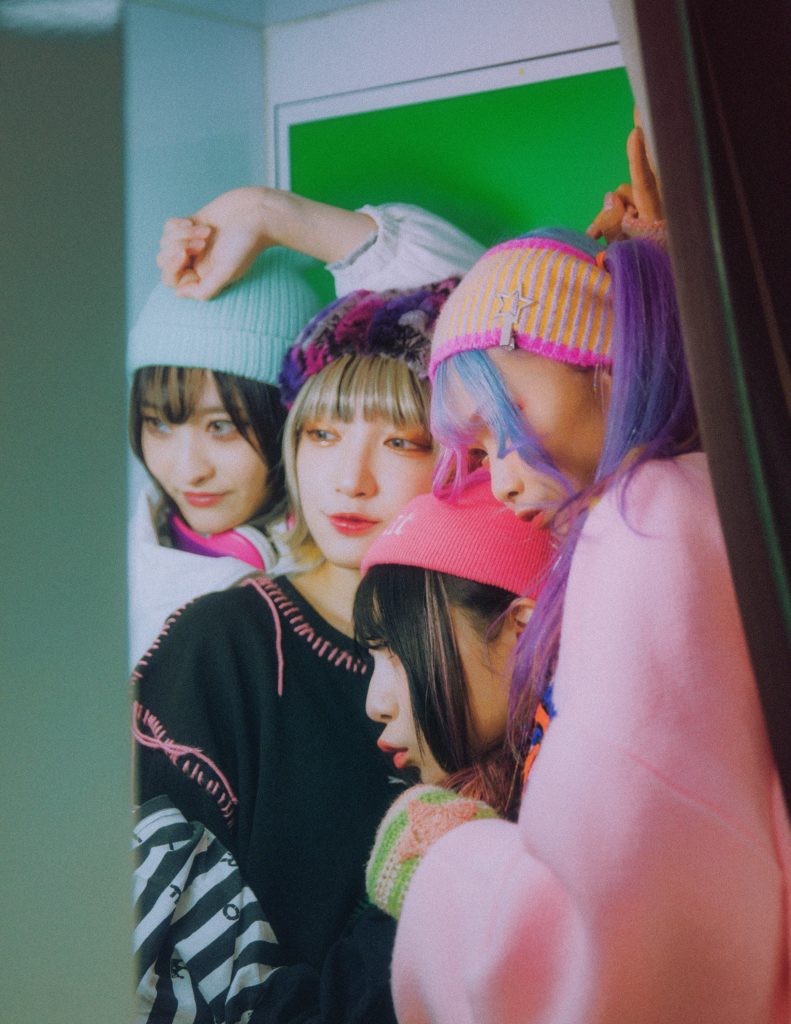
– Competition with the other bands?
Matsuri: Yes. Of course, we were surrounded by other girl bands with competitive streaks, which created this great synergy among us. We were all only focusing on our bands.
Yukina: It motivated us a lot.
Matsuri: None of us were romantically involved either, because there was no one around! (laughs).
Yukina: We even snapped at our teachers for not letting us do what we wanted.
– For example?
Matsuri: We weren’t allowed to play shows outside our high school. They claimed it was dangerous and that underage kids shouldn’t be playing at venues that serve alcohol. In retrospect, it’s obvious why it wasn’t permitted (laughs). But back then, we wanted so badly to play at an outside venue that we pleaded with our school to let us play if our parents chaperoned.
Yukina: We got signatures from several teachers, too (laughs).
– You could do that?
Yukina: The paperwork had spaces for our homeroom teacher, head of year, vice principal and principal’s signatures. We rallied the support of some teachers in the process.
– Did you feel like you needed to write original tunes as you were competing with other bands?
Matsuri: Definitely. Other bands in the club started writing originals first. That freaked us out, which prompted us to start writing our own (laughs). We also started participating in high school band contests. Bands that entered those contests usually had original songs, which made us want to start writing our own, too.
– HANABIE. is a band that consciously strays from what other bands are doing. Were you like that since high school?
Yukina: That’s true… (laughs). Even the name HANABIE. was also created because we wanted it to be unique.
Matsuri: English band names were popular at the time.
– The name HANABIE. is truly quite unique. It’s not a name that high schoolers would come up with.
Yukina: Our then-drummer was quite smart. She found that word for us.
Matsuri: She was also insanely competitive, and wanted us to stand out (laughs).
– HANABIE. then continued to play at many venues, mostly Shinjuku ANTIKNOCK.
Matsuri: We’d often rush to ANTIKNOCK after school, in our uniforms (laughs).
Yukina: We’d bring a suitcase full of merch to school in the morning, leave it in the corner of the classroom so the teachers wouldn’t find out, and take it to the venues after school… (laughs).
Matsuri: I had combined my amp head and pedal board onto a cart, which raised suspicion among the teachers (laughs). Hettsu also had a big pedal board, so the three of us dragged all our luggage around on days we had shows (laughs).
– And after school, what transpired when you descended the stairs of ANTIKNOCK?
Matsuri: We were so scared when we first booked ANTIKNOCK.
Yukina: It was so scary.
Matsuri: The entrance of that venue is dark, and kind of intense (laughs). We were contemplating who would go down first (laughs).
– That’s hilarious!
Yukina: I was like, you go first!
Matsuri: We were all pushing each other to go first (laughs).
– I guess you can’t see what’s at the bottom of the stairs from the outside.
Matsuri: No, you can’t. Once we went in, everyone was friendly and super nice, but it was intimidating at first.
– Was there a lot to learn on site?
Matsuri: Most of what we learned was on site. We were blessed with mentors who taught us everything, including how to plan the afterparty. We learned a lot from them.
Yukina: Matsuri asked a bunch of people about how to get the right tone on guitar.
Matsuri: Everyone was so nice, they even let me borrow gear they weren’t using. I was working part-time, but I wasn’t making enough that I could buy new gear. I was really thankful to everyone for helping me.
– There were probably no other high school girls who played ANTIKNOCK, so I’m sure everyone loved you. They wanted to help you grow.
Matsuri: Yes, everyone treated us well.
Yukina: Very much so.
– Like they were your uncles (laughs).
Matsuri: Truly! Whenever I see someone and it’s been a minute, it feels like I’m seeing an uncle because they ask me how I am (laughs).
Yukina: They keep track of us, and tell us their positive opinions on things we’ve worked on.
Matsuri: Everyone reminds us to stay healthy (laughs). ANTIKNOCK feels like a family-run venue.
A Turning Point in Music and Visuals
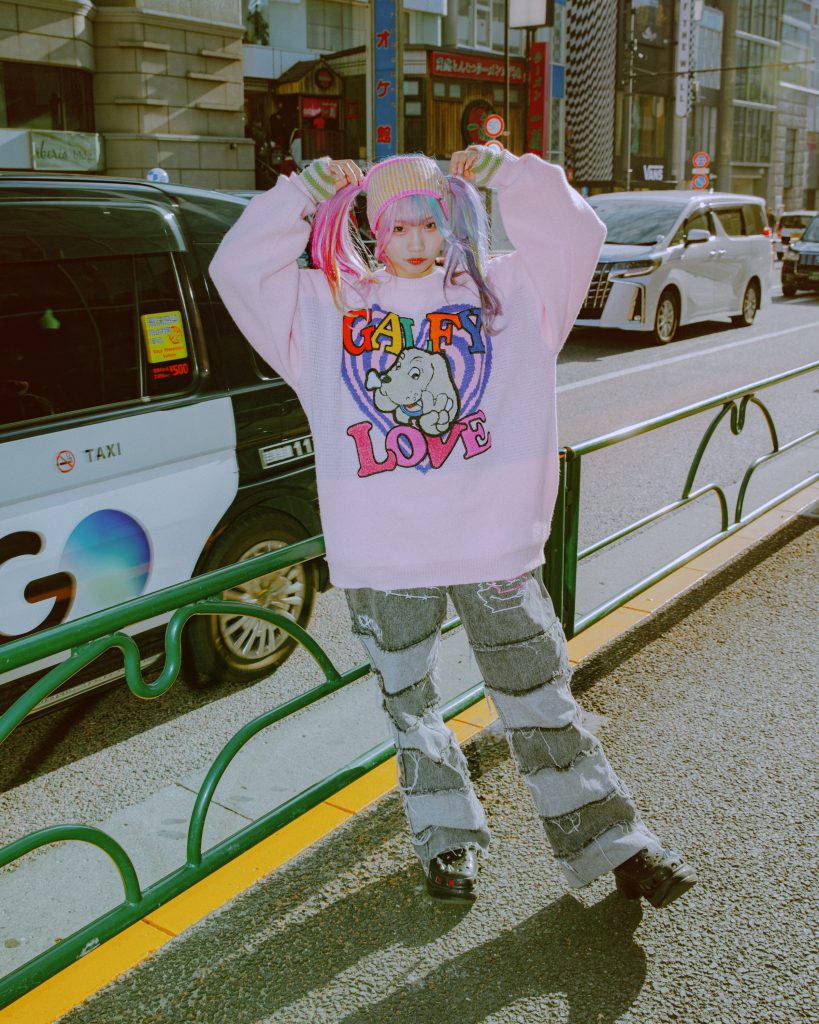
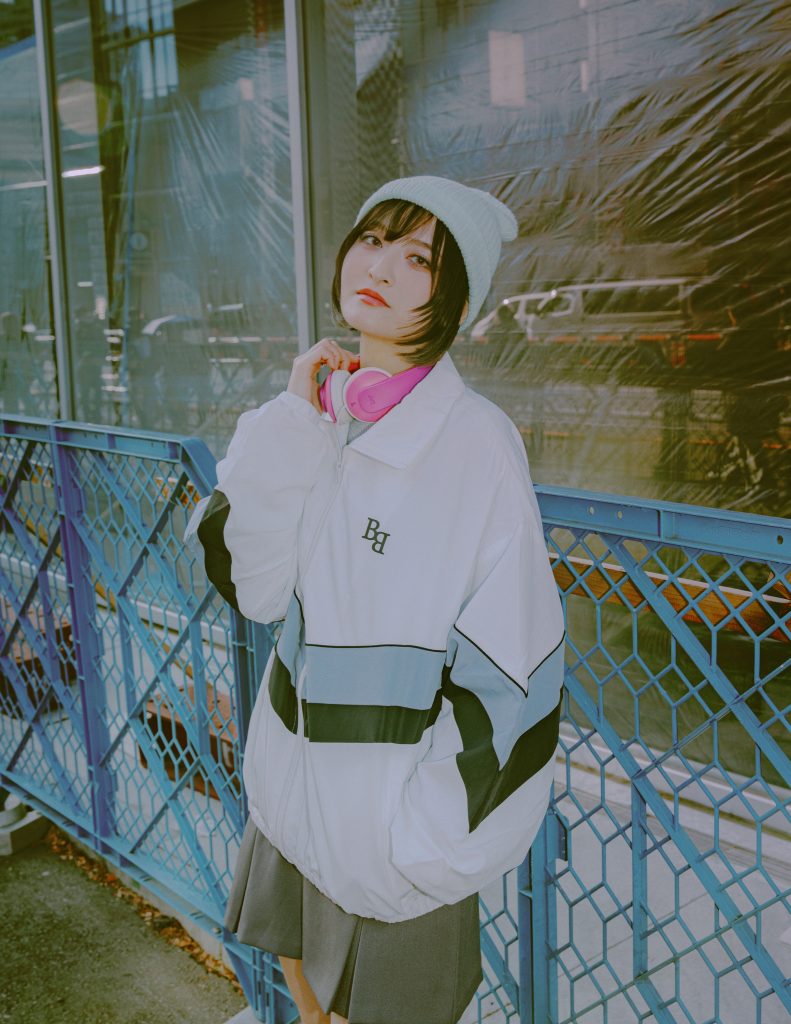
– What a nice story. I think your colorful outfits, rare for that of a metalcore band, are also what makes HANABIE. stand out. I understand that they’re made mostly by Hettsu, but how were these outfits first developed?
Matsuri: We wore normal clothes at first, right?
Yukina: Yeah, we wanted to fit in with the male bands.
Matsuri: We didn’t want to be underestimated. Back then, the metalcore scene consisted of a lot of skinny black jeans. Skinny black jeans, white T, no smile. We tried replicating that for a bit as best we could.
– You were trying to fit into the scene.
Yukina: Yes. I even got Hettsu to hold up a white T-shirt at a park so I could splatter red paint all over it to make it look like blood (laughs). We tried fitting in like that, but we soon realized that felt wrong.
Matsuri: We thought maybe it didn’t align with the type of music we wanted to do. There were a lot of similar bands back then that we wanted to differentiate ourselves from, so we did a 180.
Yukina: We thought we could take advantage of our collective love for cute anime and Sanrio characters. We knew the contrast between our music and these cutesy elements would be interesting. Hettsu’s hair became increasingly lighter, too (laughs).
Matsuri: Hettsu really did a lot. She had already dyed her hair on our graduation day. Anything is possible in the dynamics of our band now.
Yukina: We wanted to do exactly what we wanted. I think that ideology eventually reflected onto our outfits.
– So you eventually realized that that was your natural state and that it connected to the band’s originality.
Matsuri: Exactly. We thought, “everything works, including the clothes we like, the color we like, and the glitter we like!” It did take a while to get to that point, though.
– At what point did you land on your current style?
Yukina: When we were twenty?
Matsuri: I think we decided to be colorful around after the release of our single “L.C.G.” (released November 2019). Hettsu dyed her hair purple, and mine was blonde. Things gradually started changing from there.
– “L.C.G.” was musically and visually a critical turning point.
Yukina: Yes, it was the biggest turning point.
– I believe one reason for HANABIE.’s steady success is your proficiency in social media. You’ve been using social media as a strong platform for a while now.
Matsuri: Yes, we have been.
– Were you partly doing it for fun?
Yukina: No, we were told by our seniors that we should do it. They told us that it would be a waste not to upload more photos, and that our fans would be excited to see them. We realized that we could extend our following if we posted more and started to update our social media with more photos everytime we had a show.
Matsuri: In the beginning, we had an account but didn’t really use it. We would post a photo if we had a show, but that was about it. We realized that wasn’t communicating our individual personalities, and discussed how we could do that more efficiently. We never uploaded selfies until then, but started to post more after we realized that no one knew who played what instrument.
– HANABIE. utilizes X (formerly Twitter) and Instagram, and even uploaded live videos on YouTube during the COVID-19 pandemic, even before you had a management team. I was amazed at your diligence.
Matsuri: All of our shows got canceled because of the pandemic. We made videos very diligently back then because we didn’t want to be forgotten.
– What you did out of necessity during the COVID-19 pandemic has directly connected to your success today.
Matsuri: Exactly. If it wasn’t for the pandemic, we may not have made full use of social media. We learned a lot from our time during COVID-19.
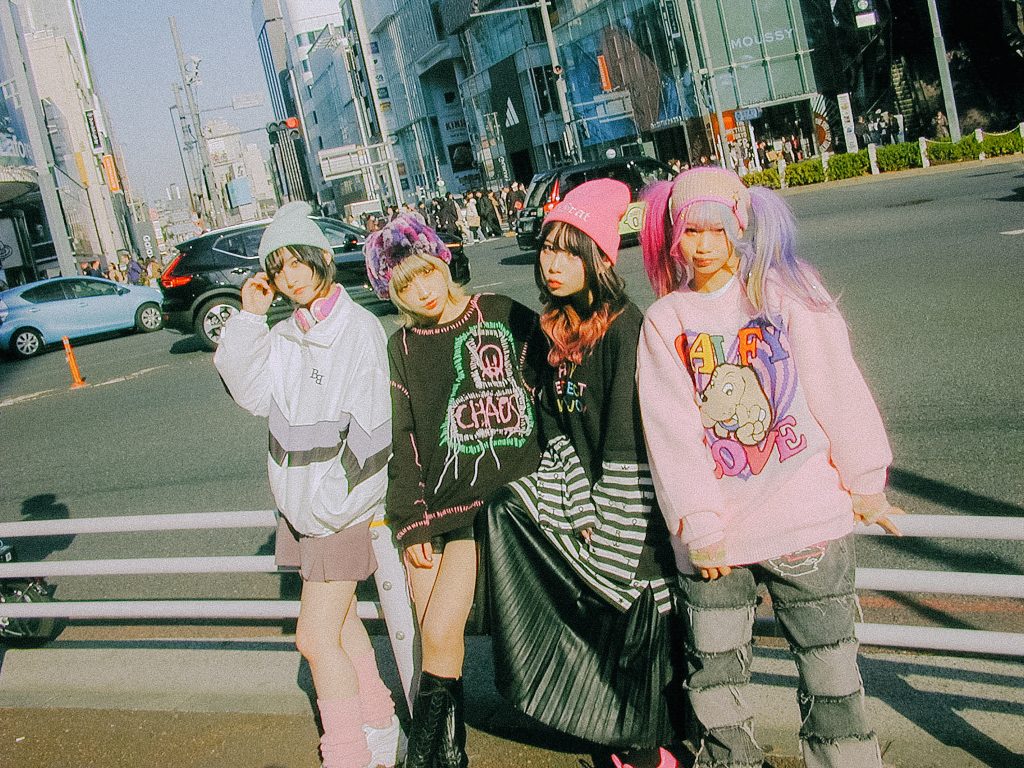
Photography Yoshitake Hamanaka
Translation Mimiko Goldstein
■HANABIE.”O・TA・KU Lovely Densetsu” now streaming
■HANABIE. Major label debut album Reborn Superstar! official website

